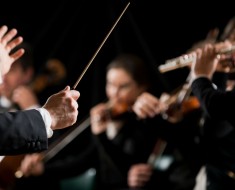Herbert Blomstedt was being interviewed during a Prom interval. The veteran conductor was there to conduct the Gustav Mahler Jurgen Orchestra in a performance of Bruckner’s last and unfinished symphony, his ninth. The conductor enthused about the originality of the composer, saying that in some ways he was more adventurous than Gustav Mahler, who was his pupil at one time and called the older man his ‘forerunner’. From humble beginnings and the first of eleven children, Bruckner showed marked musical ability at an early age, played the violin instinctively but became famous as an organist with an unusual gift of improvisation that brought him to the organ loft of many distinguished churches and cathedrals. He was a man of simple faith and little confidence. He was surprised when he was appointed to a professorship at the Vienna Conservatory.
Some would say that his organ compositions and religious works are his best, but it is for his larger orchestral work that he is now remembered.
It took most of his life for them to be accepted and loved. The symphonies are remarkable and quite distinctive amongst that extraordinary period of creativity in Vienna. I am both moved and disturbed by them. He has this habit of composing their movements as though all the time he is leading us to an almighty climax, but which once reached is immediately stilled, there is a pause, and then the long journey towards the next climax begins. In fact when his first symphony was being rehearsed in Vienna, the players called it the ‘Rest’ symphony.
Remembering the BBC interview I took my recording of the 9th to play as I travelled for an hour or so, meeting an old school friend for lunch. Our small car felt taken over, massively occupied by the music (I did have the volume quite loud, but you need that with Bruckner). I can still hear the climaxes of the adagio last movement in my mind as I write.
On some difficult roundabouts and corners, I had to turn the sound down or I would have lost my concentration on the driving.
Although he worshipped Wagner, called him ‘the master of masters’ and was influenced by him (especially in the use of the combination of tuba and French horn that was created especially for his operas), became a member of Wagner’s inner-circle and dedicated his third symphony to him, Bruckner was an original.In no way fashionable, always the student, constantly changing his mind so that there are various editions of the nine symphonies, there is an endearing but also elemental quality in the symphonies. Some say that only now he is fully coming into his own.
But better to listen to the symphonies in a great space like London’s Royal Albert Hall, rather than in a small car!
B.
R.



